Free Online Productivity Tools
i2Speak
i2Symbol
i2OCR
iTex2Img
iWeb2Print
iWeb2Shot
i2Type
iPdf2Split
iPdf2Merge
i2Bopomofo
i2Arabic
i2Style
i2Image
i2PDF
iLatex2Rtf
Sci2ools
122
click to vote
PAKM
2000
2000
A Framework to Create Performance Indicators in Knowledge Management
Knowledge management (KM) is emerging as one of the most powerful management tools in today's manufacturing. It looks at the company resources in order to gain competitive advantage. The management of these resources can mean the difference between success and failure in a competitive environment. This encourages companies to look for better ways in the management of these intangible assets, developing KM projects in order to provide KM solutions to solve knowledge bottlenecks through Knowledge processes. However, if KM solutions are considered as an important part in today's businesses, they should be under the same controls as other management solutions, implying that Knowledge management solutions should be monitored as traditional solutions in order to assess the impact on the business objectives.
Related Content
| Added | 01 Nov 2010 |
| Updated | 01 Nov 2010 |
| Type | Conference |
| Year | 2000 |
| Where | PAKM |
| Authors | Rajkumar Roy, Francisco M. del Rey, Bert van Wegen, Andy Steele |
Comments (0)

